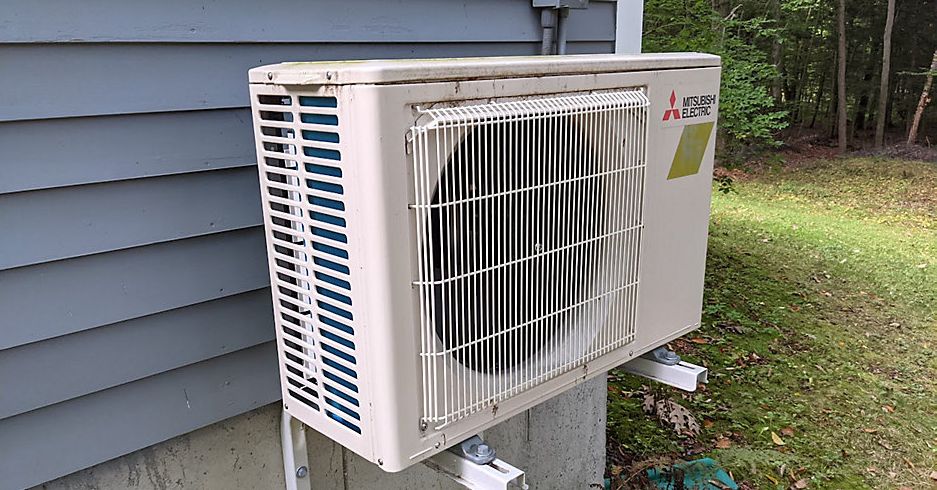New England oil and gas companies are calling on states like Maine to pause their climate change-driven incentives for electric heat pumps, citing concerns from the region's power grid manager about shortages of fuel to keep the lights and heat on this winter.
But the nonprofit that runs the grid, ISO-New England, said its concerns are not driven by states' efforts to install more heat pumps in place of climate-warming fossil fuels. And climate policy leaders in Maine and beyond called the fossil fuel companies’ request regressive and unwarranted.
The letter to the six states’ governors came from the Maine Energy Marketers Association and similar groups around the region. It cites the blackouts in Texas during a cold snap in early 2021 and recent warnings from the ISO.
Earlier this month, the grid manager said the Texas crisis was a stark reminder that New England, too, operates on especially tight margins at this time of year. The region has limited pipeline space to import natural gas, which is used heavily for both electricity and home heating in the cold months of winter. This year, the ISO says high oil prices and supply chain back-ups are causing more strain.
If the region runs low on these fuels during a long cold snap this winter — more possible, even with a mild winter forecast, due to the volatile weather trends of climate change — the grid manager warned it could have to call for conservation measures or controlled outages to lower demand for electricity.
Those climate trends are caused by the use of fossil fuels. New England gets about half its electricity from natural gas, and Maine relies more on oil for home heating than any other state, putting rural and low-income residents particularly at risk of price spikes and volatile supplies.
Maine has prioritized replacing those oil systems with electric heat pumps, which policymakers argue are now more able to work in cold temperatures and use electricity far more efficiently than baseboard heaters. The state has installed tens of thousands of these systems the past few years toward a target of 100,000 by 2025.
But the region’s fossil fuel companies claim this push for electric heating will cause untenable strain on the grid this year.
“We're trying to help avoid a catastrophic failure, and current state energy policy continues to lead us down the line (toward that),” Chris Herb, CEO of the Connecticut Energy Marketers Association, said at a Zoom press conference Thursday.
He and his counterparts around the region said their states should pause their subsidies for heat pumps and push instead for more “renewable” gas-heating technology, which uses fuel derived from trash, food waste and other replenishable biological sources.
ISO-New England spokesman Matt Kakley did not share these concerns. He said the ISO has forecast only about 52 megawatts of new power demand related to heat pump adoption this winter, accounting for less than 1 percent of peak demand in normal weather conditions.
“Our concerns this winter stem from fuel supply chain issues during prolonged periods of very cold weather,” Kakley said.
Hannah Pingree, who leads Gov. Janet Mills’ Office of Policy Innovation and the Future, said in a tweet that the oil groups’ request was a “pretty shocking tactic in the face of catastrophic climate events and future threats.” Her office didn’t respond to a request for further comment.
Herb contended that climate policies like Maine’s, which prioritize heat pumps and electric vehicle adoption, are “racing ahead” of the ISO’s capacity to keep up with changing demand.
Kakley said the ISO is “working very closely with the New England states to ensure a reliable transition to a clean energy future,” including by forecasting increased demand from policies that push for heat pump and electric vehicle adoption.
“Electrification of these sectors will help the states achieve their decarbonization goals and will require investment in new, clean-energy resources to serve this additional electrical demand,” he said. ISO officials have said in the past that these increasing renewable resources would ideally include large-scale offshore wind and imported hydropower, along with energy storage.
Scientists say the world must stop using fossil fuels altogether in order to avert the worst effects of climate change. But New England’s oil and gas companies say they have other plans to become “carbon-neutral” by mid-century, using a lower-emissions mix of low-sulfur diesel, propane and biofuels, including new kinds in development in Maine that are derived from wood.
“We need to focus on solutions (like wood fuels) and not simply something that sets us up for a single point of failure,” Maine Energy Marketers CEO Charlie Summers said Thursday. “The best approach is a broad-based energy portfolio. … It’s the delivery system that works, that’s in effect today, and it's not something that, as they say, is a little bit pie in the sky.”
Peter Rothstein, who leads the Northeast Clean Energy Council, an advocacy group, called the oil companies’ letter “disingenuous” in a statement.
“Heating oil is a fuel of the past. Technologies like air source heat pumps are the future,” Rothstein said. “Electrifying our heating sector will insulate customers against the price volatility customers are experiencing this winter from oil and natural gas price jumps.”
In an interview Friday, Summers said he acknowledges that current heat pump installations in Maine aren't an existential threat to the stability of the grid. But he said he worries that the state is promoting the technology to the exclusion of all others, especially biofuels.
"The issue is ... the continued push toward electrification without regard for the stability or fitness of the power grid," Summers said. "When the states are seemingly taking an all or nothing approach ... that's a short-sighted approach."
This story was updated to include additional comments from the Maine Energy Marketers Association.








